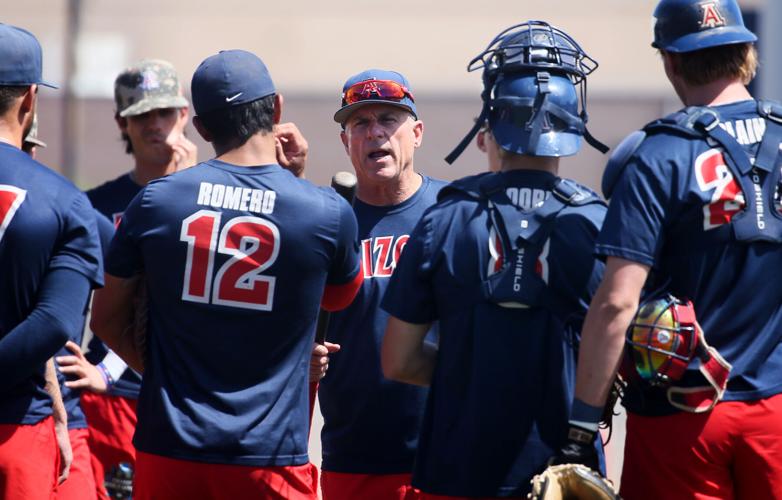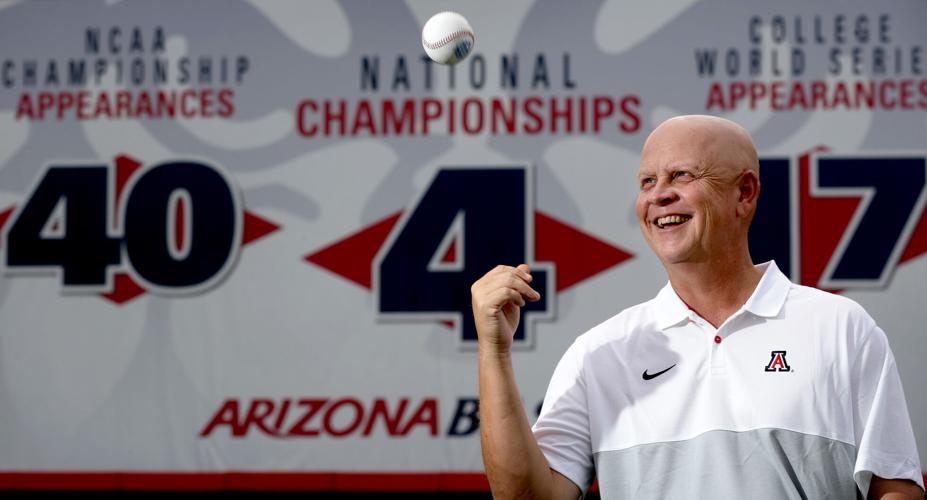Had baseball’s Data Revolution begun a bit earlier, maybe Kevin Vance would’ve made the big leagues.
Arizona’s new pitching coach posted respectable numbers in the minors, including a 3.81 ERA and 365 strikeouts in 328 1/3 innings. But he was a 6-foot right-hander who didn’t approach triple digits on the radar gun — for a time the only measurement of a pitch’s movement that anyone had. Triple-A was as far as he got.
“I think I had some outlier stuff,” Vance said. “But no one really knew it. It was just like, ‘Man, they don’t hit the ball.’
“If I knew the information that I know now, just like anyone, I think I would have went a lot further. And that’s what drives me as a coach.”
Although he excelled as a high school player (Torrey Pines) and as a collegian (UConn), Vance had the coaching bug since his teen years. When he made the transition to coaching in 2017 with Rhode Island, the revolution was well underway. Vance vowed to use every piece of data at his disposal to get the best out of his pitchers.
After helping Rhode Island post top-four ERAs in the Atlantic 10 in all five of his seasons in Kingston, Vance spent two years at Boston College. This past season, the Eagles made the NCAA Tournament for the first time since 2016.
Vance didn’t have a direct line to UA coach Chip Hale — even though they overlapped for a season in the Diamondbacks organization — but knew people that knew him. Those people spoke highly of Vance, who was named as Dave Lawn’s successor on June 12.
Vance was still in the process of moving out of his Boston-area home when he spoke to the Star via Zoom this past week. He’ll be in Tucson full time any day now. In the meantime, he’s been communicating with the Wildcats’ returning pitchers, arriving newcomers and potential signees.
Vance discussed his background, his coaching philosophy, balancing the science and art of pitching, and other topics. The conversation has been lightly edited.
You described taking this job as a “no-brainer.” Why do you see it that way?
A: “The program, the history of it. The things that you can do at Arizona are obviously very intriguing.
“I’m from San Diego originally. I’ve been on the East Coast for like 15 years. ... It was kind of a perfect double whammy for me.
“(But) it’s about going to Omaha. I want to go to Omaha. I think this is a place we can do that.
“The talent pool you can get there is incredible. The ability to develop. The resources. To be able to throw outside every day coming from up north. I’m excited for what we can do.”
Is it easier to recruit to Arizona because of the weather?
A: “For sure. (But) it’s not so much about the weather. I don’t want guys to come to U of A because they like the weather. That’s (just) part of it.
“That ‘Block A’ is pretty special. It’s iconic. It’s a very recognizable brand in baseball. It carries a lot of weight.”

Arizona coach Chip Hale, shown talking to his team before practice at Hi Corbett Field on May 30, relied on positive word of mouth in identifying Kevin Vance as the next Wildcats pitching coach.
Did you ever cross paths with Chip Hale in D-backs camp in 2015? Maybe on the backfields?
A: “We probably shook hands and said hello a couple of times. Maybe once. But I was a lowly minor-leaguer on my way out. That was toward the end of my career. I wasn’t a prospect at that point. My window was closed.
“I was there. I had a jersey. Kind of hanging by a thread.”
Your numbers in the minors were pretty good.
A: “Really solid. (Vance laughs.) I could give you a 4.00 ERA at any level.”
What appealed to you about coaching?
A: “Personality-wise, I don’t think I would be able to sit behind a desk. I enjoy the creativity of having a staff and being able to tinker with things and get guys better. Even as a player I loved it, talking to guys about what adjustments they’re making.
“I know it’s hard. You gotta grind it out for a long time. It’s tough to make money. There’s a lot of things that come with it. I’ve been really lucky to have some great opportunities.”
How would you describe your coaching style? How do you go about helping pitchers get better?
A: “I take a pretty deep dive into how they’re moving. I want to have good movers. I have a kinesiology background. In school I was undergrad kinesiology, so that got it all started. I trained at some cool places while I was playing like Cressey Performance, and that was during the revolution of baseball training. So I was in the thick of it from the beginning. Learning about stuff that no one was talking about yet.
“I want to understand each pitcher on a physical level. I’ll break it down with them and give them a full movement assessment. What you do well? What do you not do well? And teach them about it.
“(Then) we dive into a lot of pitch metrics and ball flight. Start tinkering with that, sharpen it up and make their stuff more deceptive. I want to strengthen their pitches, strengthen how they’re moving, make their pitches better.
“There’s some pretty intricate details when it comes to ... how does your body work? How do your pitches work? What are your best pitches? How often do you need to throw your best pitches? I want them to all be bought into that.
“And I think the way to do that is to teach them why. As a player I was told ‘do this’ for a lot of things. I didn’t know why. As a coach, I want them to know why. And understand why. So I take a pretty collaborative approach. I want the guys to be able to ask me anything, talk about anything, and if I don’t know the answer, I’ll find out. There’s no ego when it comes to getting them better.
“If they have ideas, a Twitter post or an Instagram post that they want to send me, that type of thing, I’m all ears. I’m always learning and learning alongside the guys. That’s the best way to get the most out of everyone — to build that trust and bounce ideas off each other.
“I want them to understand, and that’s where true confidence comes from. That’s where true buy-in comes from. So long term, I gotta build that trust and that buy-in.”
There’s so much data available now, especially for pitchers. How do you incorporate that into your pitching program?
A: “You have to use that information. Because it tells you a lot. It speeds up the process. It allows you to assess the player instead of just guessing. It’s immediate feedback.
“The way that I like to balance it is, you gotta look at ... how it relates to the player. Because everyone’s gonna have different metrics. Understand how each guy’s unique. Not try to make drastic adjustments to fit a computer (model).
“Pitching, to me, it’s an art. So it’s a balance of the science of it and the art of it. A lot of times, if you talk about things like rhythm or mindset, just where your focus is, that makes your numbers on the computer better.”

Arizona assistant coach Trip Couch will remain a primary recruiter for the Wildcats. New pitching coach Kevin Vance, who's been a recruiting coordinator elsewhere, says the two will 'combine forces' on the recruiting front.
Shifting gears to recruiting, Trip Couch has been in charge of recruiting under Chip. But you’ve been a recruiting coordinator. How can that be an asset to the Wildcats?
A: “Trip is awesome. We’re just going to combine forces and find the best way for us to build our contacts. He’s been doing this for a long time, so he probably has infinitely more contacts than I do. But I still have my pockets, areas that I’ve recruited pretty hard. We’re still figuring that out.”
Beyond whatever data you’re able to gather, what are you looking for in a pitcher?
A: “I’m looking for guys that are athletic — athletic movers. Guys that are competitors. Guys that have presence on the mound. Those are a lot of the things that’s sometimes it’s hard to teach. Guys that want it. Guys that are going to work hard.
“Having some presence on the mound is pretty important to me. ... When you have that guy that is in control out there, commanding the game, then you got something good.”
Arizona coach Chip Hale closes the book on the 2023 season after the Wildcats were eliminated from the NCAA Tournament via a 9-3 loss to Santa Clara (video by Michael Lev / Arizona Daily Star)


![[DO NOT USE AFTER 10/22/23] Kevin Vance - Arizona baseball](https://bloximages.chicago2.vip.townnews.com/tucson.com/content/tncms/assets/v3/editorial/c/20/c20d6e14-06f8-11ee-8a09-0f82563d0aff/64837904a0ad3.image.jpg?resize=750%2C500)


![[DO NOT USE AFTER 10/22/23] Kevin Vance - Arizona baseball](https://bloximages.chicago2.vip.townnews.com/tucson.com/content/tncms/assets/v3/editorial/c/20/c20d6e14-06f8-11ee-8a09-0f82563d0aff/64837904a0ad3.image.jpg?resize=1200%2C800)

